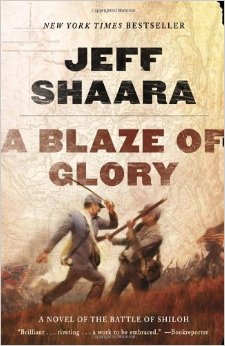
Jeff Shaara
Ballantine Books, 2012, 437 Pages, $28.00
ISBN: 978-0-345-52735-6
Image courtesy of amazon.com
There are many Gettysburg historians who credit their first exposure to the battle from The Killer Angels still to this day years after its publication, but Michael Shaara never wrote another novel on the American Civil War. Instead, his son took up the mantel and gave us works such as Gods and Generals and The Last Full Measure. Since then, Jeff Shaara has written many works on the military engagements of the United States from the American Revolution all the way to World War II. Now, during the sesquicentennial of the Civil War, he returns to where he got his start but sets his focus on the war in the west. Initially planned as a trilogy, it is now a four part saga starting with A Blaze of Glory which is a novel about the Battle of Shiloh. Not only does he go back to his roots with this novel, he goes back to the roots of his father and mimics the writing style of The Killer Angels by writing a novel only about the battle instead of a number of years.
Jeff Shaara is a New York Times bestseller and began his career with the work preceding his father’s called Gods and Generals and finished the story with The Last Full Measure. Shaara has won numerous accolades for his works on the revolution called Rise to Rebellion and The Glorious Cause. After his series on the Civil War in the West, he will be pursuing the Texas conflict and the Korean War.
Much like the rest of the works in his line of fiction, he sets chapters apart with characters who are the main points of his narrative. There is an even separation between north and south characters which works to his advantage in this manner and spends a good amount of time telling the reader how the battle was planned between Generals Johnston and Beauregard. On the other side of the battle, the high command of Generals Grant and Sherman deal with the political interference of Henry Halleck before the attack made at Shiloh. The other major characters are soldiers in the armies and one other commander for the Confederacy, Nathaniel Bedford Forrest. Because Shaara spends this work only on the Battle of Shiloh, those who are looking for a narrative on the Battles of Fort Donelson and Henry will be disappointed. This book shines because it only deals with one major battle unlike some of his other works which span years at a time. Many claim Shaara’s The Steel Wave as one of the best of his works due to the fact that he only deals with the invasion of Normandy. When Shaara reaches the battlefield, and the action erupts, he spends a good time surrounding the first day of combat and the one flaw readers can tend to find is that he does not spend enough time surrounding the second day of the fighting. He also deals with the character of Nathaniel Bedford Forrest in a way that readers would not gain the information that he was one of the heads of the Ku Klux Klan. While this is important to know that for the history of the country, the Civil War history should not deal with him in that manner unless the book has something to do with reconstruction. I was greatly impressed with the fact that he was able to deal with Forrest in a humane way and not bring out the darkness in the man just because he was a character in his work. One of the other main points in the book which was done well was the death of General Johnston. You could feel the tension of what happened when he died due to the narrative which Shaara presents.
I highly recommend this book to anyone who is an avid reader of Civil War fiction and are always looking for new things outside the realm of the Eastern Theater of the war. It is a rarity to see works which will stand up against the ethos of the nonfiction realm of the Civil War and while Shaara has received criticism in the past for his works, I feel as though the works bring people into the war and into the study of the conflict. As stated before, many Gettysburg historians can credit their interested into the battle because of his father’s book. Now, he is carrying that even farther with his work in the west, a place where many people tend to forget when it comes to this great conflict.
 RSS Feed
RSS Feed
